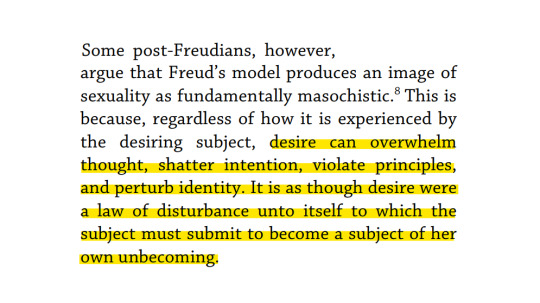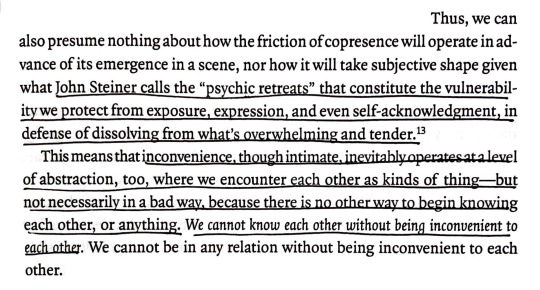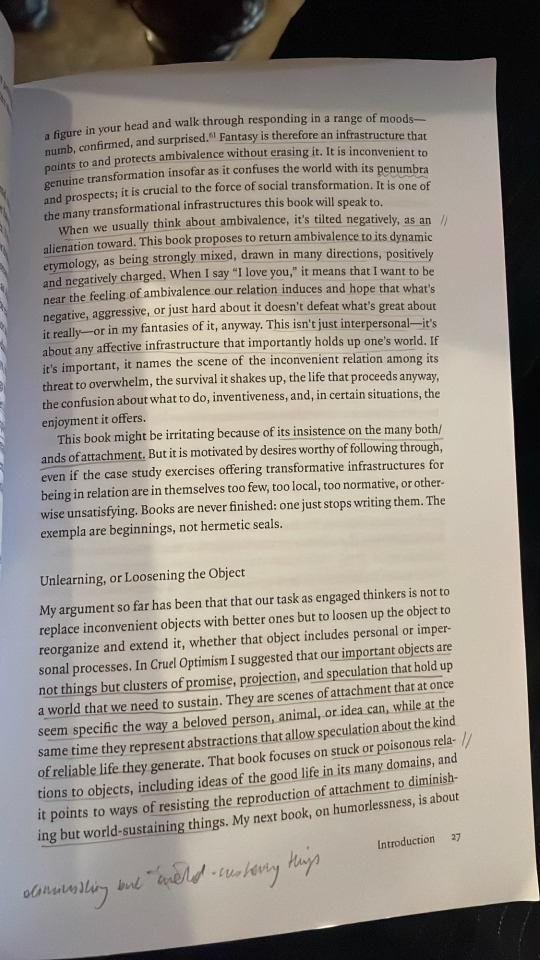#Lauren Berlant
Text

on the inconvenience of other people, lauren berlant
91 notes
·
View notes
Text
Lauren Berlant:
…
“I often talk about love as one of the few places where people actually admit they want to become different. And so it’s like change without trauma, but it’s not change without instability. It’s change without guarantees, without knowing what the other side of it is, because it’s entering into relationality.
The thing I like about love as a concept for the possibility of the social, is that love always means non-sovereignty. Love is always about violating your own attachment to your intentionality, without being anti-intentional. I like that love is greedy. You want incommensurate things and you want them now. And the now part is important.
The question of duration is also important in this regard because there are many places that one holds duration. One holds duration in one’s head, and one holds duration in relation. As a formal relation, love could have continuity, whereas, as an experiential relation it could have discontinuities.
When you plan social change, you have to imagine the world that you could promise, the world that could be seductive, the world you could induce people to want to leap into. But leaps are awkward, they’re not actually that beautiful. When you land you’re probably going to fall, or hurt your ankle or hit someone. When you’re asking for social change, you want to be able to say there will be some kind of cushion when we take the leap. What love does as a seduction for this is, and has done historically for political theory, is to try to imagine some continuity in the affective level. One that isn’t experienced at the historical, social or everyday level, but that still provides a kind of referential anchor, affectively and as a political project.“
7 notes
·
View notes
Photo

Lauren Berlant, Desire/Love
101 notes
·
View notes
Quote
I had confused feminism with self-sufficiency. It’s useful to know how to change a belt, but it’s more important to realise that dependence on others is not antagonistic to feminism but intrinsic to it, and to unlearn, as Berlant puts it, a particular fantasy of self-sovereignty, exchanging an attachment to a liberal tradition of selfhood for a conception of necessary reciprocity...
Sex is one of the central objects of Berlant’s critique, representing in its most heightened form the desire for ‘an impossible state of things: the perfect rhythm of being in and out of control, of being open and closed in the right or bearable ways’. At the same time, the intimacy of another person presents various challenges to that fantasy. A wayward limb. An awkward touch. The wrong word, whispered in the wrong tone. Sex is disturbing, and consensual sex means consenting to being disturbed; it is ‘a good that can reveal your incoherence, your love of a little disorder, your love of a little control’.
Erin Maglaque, I feel sorry for sex
28 notes
·
View notes
Text
Reading [Desire/Love], I came to recognize the irony of trying to trace my desire’s paths in order to figure out what my story should be. As Berlant’s accounting of psychoanalytic theories of desire demonstrates, desire is a fundamentally unstable force that constantly misrecognizes its objects. The thing we really desire (to return to our imagined infantile cohesion with our environments) is impossible and maybe even never existed in the first place. Instead, we are doomed to simply repeat these misfires endlessly. The objects of your desire are merely “things and scenes that you have converted into propping up your world”—they are “shaky anchors,” certainly not enough to build a whole identity on.
That is not to say that sexual identity is meaningless. This kind of categorization via, say, labels that allow for visibility for non-normative identities or relationships (sexual and otherwise) is of course useful, in that it gives people a context in which to understand themselves and each other. It’s also politically important, in that it allows us all to build alliances through our shared investment in imagining and protecting possibilities beyond existing norms, which are “white, Western, heterosexual, and schooled to the protocols of ‘bourgeois’ privacy” (as Berlant puts it) and thus actively harmful to many people. But reading Desire/Love, I was able to see that who I fuck, their particular understandings of their genders or sexualities at that time, and my particular understandings of those things, is not in and of itself a path toward answering that existential question “Who am I?” or even “What should my life be?” even as the conventional cultural pairing between desire and self can make me think that it is.
Christina McCausland, Losing the Plot: On Lauren Berlant's Desire/Love.
[emphasis mine]
31 notes
·
View notes
Text
“But does this mean that true gentleness contains an element of negativity? [...] There is a gentleness in the farewell to life, in the ‘disconnection, the illusion of total disconnection,’ in abandonment, in bereavement, in renunciation.”
—Lauren Berlant, intro to Anne Dufourmantelle’s Power of Gentleness: Meditations on the Risk of Living
“I liked Hell,
I liked to go there alone
relieved to lie in the wreckage, ruined, physically undone.”
—Marie Howe, Magdalene: The Addict
“Is it possible to say ‘no’? A cut and dry ‘no’ that is inconvertible to a ‘yes’? [...] Is there a way for life to say no to itself? No to continuity; no to the resistance of memory or childhood; no to beautiful form; no to sensible metamorphosis; no to gradual decline; no to the progress of the negative itself. These questions can be summed up in a single question: is there a mode of possibility attached exclusively to negation?”
—Catherine Malabou, Ontology of the Accident tr. Carolyn Shread
#Lauren Berlant#Marie Howe#Catherine Malabou#a mode of possibility attached exclusively to negation#i liked hell#keep quite still and wait#blurring of affect
42 notes
·
View notes
Text
Eating is their time. It's their time. When either woman travels, she marks time by eating. When she waits, she eats. When she thinks, she eats. [...] among other things, the practice of eating provides a way to negotiate one's incoherence while not organizing a personality to compensate for it.
[...] accordingly, the more intense the desire, the emptier the body feels. To empty out one's emptiness through work is something like negating the negation, at least for a minute, because work is absorbing, like eating. But Dorothy also shows that one cannot help but be original or to desire.
It was in Ohio that I developed what my mother came to call my "unattractive habits." First, I stopped brushing my teeth, except on rare occasions. All at once, I hated putting the paste-laden brush into my nice warm mouth and scraping the intriguing texture of food from my teeth, annihilating the rich stew of flavors, the culinary history of my day, and replacing it with the vacuous mint-flavored aftertaste, the empty cavern of impersonal ivory …. In addition, I began giving in to gross and unhealthy cravings: candy bars, ice cream, cookies, sugar in wet spoonfuls from the bowl, Hershey's syrup drunk in gulps from the can, Reddi Wip [sic] shot down my throat, icing in huge fingerfulls from other people's pieces of cake.
Her body is a kitchen in which the things of exchange become thingness, sensory knowledge, and material for a countertemporality ("the culinary history of my day") [...]
It would be too grand to call any of these moments of food exchange "agency" in any transformative or transcendent sense. [...] It involves attempts to experience moments of negative density. Inhabiting such dense moments of sensuality stops time, makes time, and saturates the lived, imagined, and not-yet-imagined world. The impossible act the girls seek to repeat, for which food and eating serve as substitutes, merges will and repetition to produce something not uncomplicated or amnesiac, but something that as yet has no content, just inclination.
Cruel Optimism, Lauren Berlant
3 notes
·
View notes
Text
"The question of political organising then becomes: where do you want to focus your build? Are you somebody who gives food out? Do you give your money to an NGO or do you respond to Excel sheets, such as the ones we have in my neighbourhood, where people can put down their needs? What about the circulation and communication of a counter-organisation of the world: who hears it, who is affected by it? Do you have compelling arguments for people to interrupt their life? Because the question of scale is also about risk: who is willing to risk the interruption of their specific life in order to have a lifeworld they would welcome? In short, what are you doing with the time you don’t have to make something else happen?"
-- Lauren Berlant in Extra Extra
4 notes
·
View notes
Text
All attachment is optimistic, if we describe optimism as the force that moves you out of yourself and into the world in order to bring closer the satisfying something that you cannot generate on your own but sense in the wake of a person, a way of life, an object, project, concept, or scene.
But optimism might not feel optimistic. Because optimism is ambitious, at any moment it might feel like anything, including nothing: dread, anxiety, hunger, curiosity, the whole gamut from the sly neutrality of browsing the aisles to excitement at the prospect of “the change that’s gonna come.”
Lauren Berlant, Cruel Optimism
40 notes
·
View notes
Text

on the inconvenience of other people, lauren berlant
81 notes
·
View notes
Text

Love this so much!! From Lauren Berlant – On The Inconvenience of Other People
4 notes
·
View notes
Photo

Lauren Berlant, Desire/Love
84 notes
·
View notes
Quote
Other people aren’t hell, Berlant writes, just bothersome, ‘which is to say that they have to be dealt with’. Why is it so hard to live with other people? And why do we seek to ease the friction of intimacy and collective life even as we are driven towards encounters that create friction? Knowing someone, and being known, for Berlant, involves a threatening inconvenience: the irruption of someone else into your (fantasy of a) coherent self.
Inconvenience helps us loosen our attachment to the ideals, fantasies and ideologies that limit and sometimes harm us.
Erin Maglaque, I feel sorry for sex
7 notes
·
View notes
Quote
When politics is serious, it risks a loss of the ground of living in which people have come to know their competencies and their desires: fantasy, in contrast, is a zone of stop-loss, a demand for the ongoing present to be the scene of lived fulfillment.
Lauren Berlant, The Female Complaint
#lauren berlant#the female complaint#political theory#antipolitics#political feeling#everyday life#crisis ordinariness
5 notes
·
View notes
Text
Why do people stay attached to conventional good-life fantasies—say, of enduring reciprocity in couples, families, political systems, institutions, markets, and at work—when the evidence of their instability, fragility, and dear cost abounds? Fantasy is the means by which people hoard idealizing theories and tableaux about how they and the world “add up to something.” What happens when those fantasies start to fray—depression, dissociation, pragmatism, cynicism, optimism, activism, or an incoherent mash?
Lauren Berlant, Cruel Optimism
5 notes
·
View notes
Text
What is it about icing that links it to joy, to empire and excess and the sovereign tongue?
The Hundreds by Lauren Berlant and Kathleen Stewart
1 note
·
View note